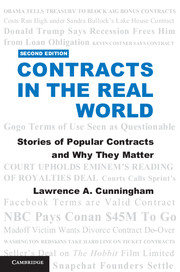Book contents
- Frontmatter
- Dedication
- Contents
- Annotated Contents
- Acknowledgments
- Introduction
- 1 Getting In: Contract Formation
- 2 Facing Limits: Unenforceable Bargains
- 3 Getting Out: Excuses and Termination
- 4 Paying Up: Remedies
- 5 Rewinding: Restitution and Unjust Enrichment
- 6 Writing It Down: Interpretation, Parol, Frauds
- 7 Performing: Duties, Modifi cation, Good Faith
- 8 Hedging: Conditions
- 9 Considering Others: Third Parties and Society
- Conclusion
- Appendix A Offering and Accepting
- Appendix B Buying and Selling Goods
- Notes
- Table of Cases
- Index
7 - Performing: Duties, Modifi cation, Good Faith
Published online by Cambridge University Press: 05 March 2016
- Frontmatter
- Dedication
- Contents
- Annotated Contents
- Acknowledgments
- Introduction
- 1 Getting In: Contract Formation
- 2 Facing Limits: Unenforceable Bargains
- 3 Getting Out: Excuses and Termination
- 4 Paying Up: Remedies
- 5 Rewinding: Restitution and Unjust Enrichment
- 6 Writing It Down: Interpretation, Parol, Frauds
- 7 Performing: Duties, Modifi cation, Good Faith
- 8 Hedging: Conditions
- 9 Considering Others: Third Parties and Society
- Conclusion
- Appendix A Offering and Accepting
- Appendix B Buying and Selling Goods
- Notes
- Table of Cases
- Index
Summary
In a civilized society people must be able to assume that those with whom they deal will act in good faith.
– Roscoe PoundImplied Terms: Butch Lewis and Maya Angelou
Maya Angelou was a renowned poet and professor at Wake Forest University until her death in 2014 at the age of eighty-six. From the time of her 1969 autobiography, “I Know Why the Caged Bird Sings,” her acclaimed poetry had been published widely by Random House and initially reached a distinguished, albeit small, audience. In 1994, Butch Lewis, the former prize fighter and promoter of famous boxers such as Muhammad Ali and Joe Frazier, conceived the idea of popularizing Angelou's poetry by including it in greeting cards and similar media. The idea proved spectacularly successful. Hallmark greeting cards using Angelou's poetry have generated hundreds of millions of dollars in company sales and many millions in author royalties. Lewis and Angelou fought a pitched, eight-year long battle over whether they had a contract to split the take.
Lewis first met Angelou in early 1994 when the scrappy fighter asked the elegant poet to take a trip to Indiana with him to visit his boxing client, Mike Tyson, in prison. During the trip, Angelou and Lewis discussed how she might expand her readership by publishing her works in greeting cards. After negotiations, the two signed an informal letter of agreement on November 22, 1994. Angelou promised to contribute poetry exclusively to Lewis and he promised to promote its publication in greeting cards. The exclusivity feature was important because it meant Angelou could not market her poetry without Lewis and Lewis did not need to fear that his efforts would be undercut by a last-minute switch to a competing promoter.
Aside from exclusivity, the letter recited only basic terms, such as how they would later agree on what poetry to include, that Lewis would fund promotion, and how revenues would be shared – first to reimburse Lewis’ investment and expenses, then to split the rest equally. The letter said it would be binding until the two drew up a formal contract. Lewis prepared one in March 1997, but it was never signed. Lewis began marketing efforts immediately, although it took until March 1997 for Lewis and Hallmark to finalize a contract – a three-year deal, covering any new poem Angelou produced during that time.
Information
- Type
- Chapter
- Information
- Contracts in the Real WorldStories of Popular Contracts and Why They Matter, pp. 175 - 198Publisher: Cambridge University PressPrint publication year: 2016
